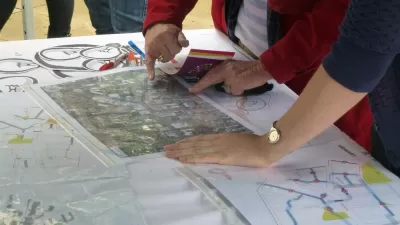A look at how streets affect health, social interaction, and economic development by Marissa Reilly, a Berkeley-based urban planner and Lillian Jacobson, a master’s candidate at MIT.
Streets aren’t just thoroughfares to get people from one place to another.
They also serve as a way to connect residents of a community and promote health and economic activity, writes Marissa Reilly, a Berkeley-based urban planner and Lillian Jacobson, a master’s degree candidate at MIT.
“Streets often change how people perceive their environment: they can make people feel safe or deter them from walking in a certain area; they can encourage social interaction or create deserted sidewalks; they can spur economic activity or stall neighborhood growth. Street design is not merely about aesthetics and modes of mobility—streets have the potential to affect the health and life outcomes of everyone who uses them.”
The authors describe the ways in which streets impact economic development, health, and social interaction.
FULL STORY: Streets as Conduits of Social Justice

Maui's Vacation Rental Debate Turns Ugly
Verbal attacks, misinformation campaigns and fistfights plague a high-stakes debate to convert thousands of vacation rentals into long-term housing.

Planetizen Federal Action Tracker
A weekly monitor of how Trump’s orders and actions are impacting planners and planning in America.

In Urban Planning, AI Prompting Could be the New Design Thinking
Creativity has long been key to great urban design. What if we see AI as our new creative partner?

How Trump's HUD Budget Proposal Would Harm Homelessness Response
Experts say the change to the HUD budget would make it more difficult to identify people who are homeless and connect them with services, and to prevent homelessness.

The Vast Potential of the Right-of-Way
One writer argues that the space between two building faces is the most important element of the built environment.

Florida Seniors Face Rising Homelessness Risk
High housing costs are pushing more seniors, many of them on a fixed income, into homelessness.
Urban Design for Planners 1: Software Tools
This six-course series explores essential urban design concepts using open source software and equips planners with the tools they need to participate fully in the urban design process.
Planning for Universal Design
Learn the tools for implementing Universal Design in planning regulations.
Gallatin County Department of Planning & Community Development
Heyer Gruel & Associates PA
JM Goldson LLC
City of Camden Redevelopment Agency
City of Astoria
Transportation Research & Education Center (TREC) at Portland State University
Jefferson Parish Government
Camden Redevelopment Agency
City of Claremont




























